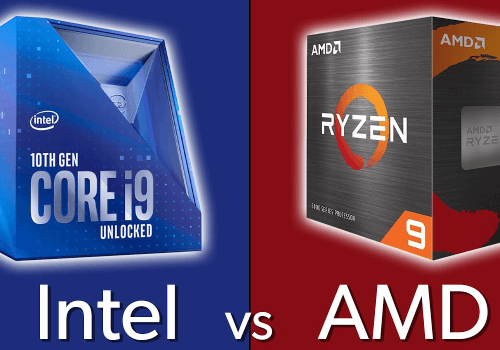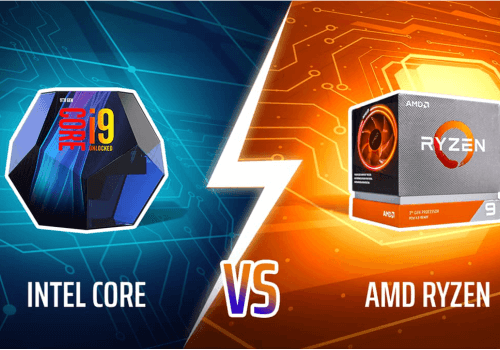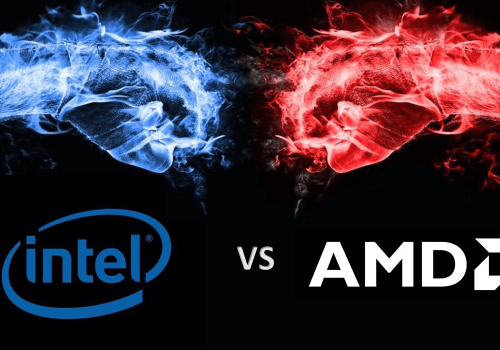AMD vs Intel
1. Integrated Electronics (Intel)
Intel stands for Integrated Electronics. Intel Corporation is an American producer of semiconductors of computer circuits.
It is a multinational company of corporation and technology whose headquarter is in Santa Clara, California, which is near
Silicon Valley. Intel was invented by Robert Noyce and semiconductor pioneers Gordon Moore on July 18, 1968. It is the
innovator of the first x86 processor that is Intel 8086x.
If we discuss a scale of 1 - 10, Intel processors lie at a scale of 4 - 10. These processors have the best performance of CPU
(central processing unit) and nearly all Intel processors follow with iGPU which stands for Integrated Graphics Processing
Unit. Intel processor clocks higher than AMD processors also, at the cost of battery life and higher power consumption.
Hence, for short load of works and single-cored boosts which is especially either in laptops or new Intel-powered laptops
that will be used when the life of the battery is not much important. If we talk regarding Desktops and you wish to change
the compatibility of its processor, motherboard, or socket, then Intel has only a few options are available for that, by
comparing to AMD processor due to its motherboard frequency and chipset changes also.
Examples of Intel;
a) Intel Xeon.
b) Intel Core I series.
c) Intel Core m series.
2. Advanced Micro Devices (AMD)
AMD stands for Advanced Micro Devices. It is an American producer of semiconductors, Multinational Corporation, and Technology
Company headquartered in Santa Clara, California. It was invented by Jerry Sanders, Jack Gifford, and John Carey on May 1,
1969. It started providing x86 processors as a secondary source of the manufacturer and became an opponent with Am386.
On a range of 1 - 10, AMD processors lie on a scale of 5 - 10. AMD processor is less costly than Intel Processors at a similar
range. These processors are more valuable, capable, and competent as compared to the current generation Core series. AMD APUs
(accelerated processing units) are also a better option for their good iGPU (Integrated Graphics Processing Unit) performance
as well as comparable CPU performance to the Core I series. Laptops with Ryzen processors clocked lower & less aggressive as
compared to Intel powered laptops, they often run - on lower temperatures and hence, provide longer battery life. Thus, for
laptops, when higher iGPU (Integrated Graphics Processing Unit) performance and longer battery life that is preferred, Ryzen
powered laptops can be considered. While constructing a new Desktop, PC or older FX series CPUs, A-series APUs and will be
avoided for their high-power utilization and heat dissipation.
If we discuss desktop PCs or laptops, and you only want to play normal games and for daily use, then a Ryzen processor is the
only way to go. For bulky tasks like video or audio editing, 3D modeling, video rendering, and much more, Ryzen 7 or 9 series
CPUs or Thread rippers should be preferred.
For Ryzen Desktop CPUs and APUs, the motherboard chipset must be checked for support or the PC may not turn on, although it can
be solved easily with motherboards with USB BIOS flashing for new processors.
Examples of AMD;
a) AMD Ryzen.
b) AMD Thread ripper.
c) AMD FX-Series.
d) AMD EPYC.
e) AMD Opteron.
f) AMD Athlon 64.
The difference between Intel and AMD are;
1. Intel vs AMD: Price
# Intel is less expensive than AMD Processor at the lower range.
# AMD is less expensive than Intel at a higher range.
2. Intel vs AMD: Efficient
# Intel is less efficient than AMD.
# AMD is more efficient than Intel.
3. Intel vs AMD: Processor node (nm)
# AMD heat up when used with Clock Speed Boost that is 14 nm.
# Intel is cool due to small lithography, that is 10 nm.
4. Intel vs AMD: IPC Rocket Lake
# Intel’s IPC (Rocket Lake) is lower than AMD (Zen 3).
# AMD’s IPC (Zen 3) is higher than Intel (Rocket Lake).
5. Intel vs AMD: Clock speed
# Clock speed reaches 5.0 GHz in Intel.
# The clock speed also reach 5.0 GHz but results in more heat in AMD.
6. Intel vs AMD: iGPU
# iGPU present in almost all Core I series CPUs in Intel.
# iGPU present only in AMD APU series in AMD.
Which CPU is best for you?
If you are looking to work with your processor performing intensive multiple tasks like audio or video editing or transcoding,
or heavy multitasking activities with tens of browser tabs open, AMD is the best option. Intel is undercutting AMD with its
high-end chips, but its performance gaps are higher than the price.
If you are working and playing on desktop PCs, or even just gaming, an AMD Ryzen 5000 CPU is still the best option. Everything
from the 5600X to the insanely powerful 5950X offers good gaming and performance is productive. Intel’s options are becoming
more affordable to make them more competitive, which might make them worth it. But, in the case of raw power, AMD holds the
lead.
If you are purchasing a new laptop, things are a little different here. Intel’s Tiger Lake offers you the best onboard graphics,
and its Tiger Lake H series CPUs are extremely capable. Ryzen 5000 chips with Zen 3 cores are also amazing and very efficient.
Still, you should look at the reviews of the overall machine instead of focusing on the CPU performance to get a full picture of
which laptop is best suitable for you.
The good news is that there really aren’t any bad choices in the CPU market - AMD and Intel are both operating at their full
capacity, so the AMD vs. Intel comparison won’t stop anytime soon. Your best choice is to go with the processor that is
cheaper, available, and works with the components that you already have.
Thanks!
Call Now




